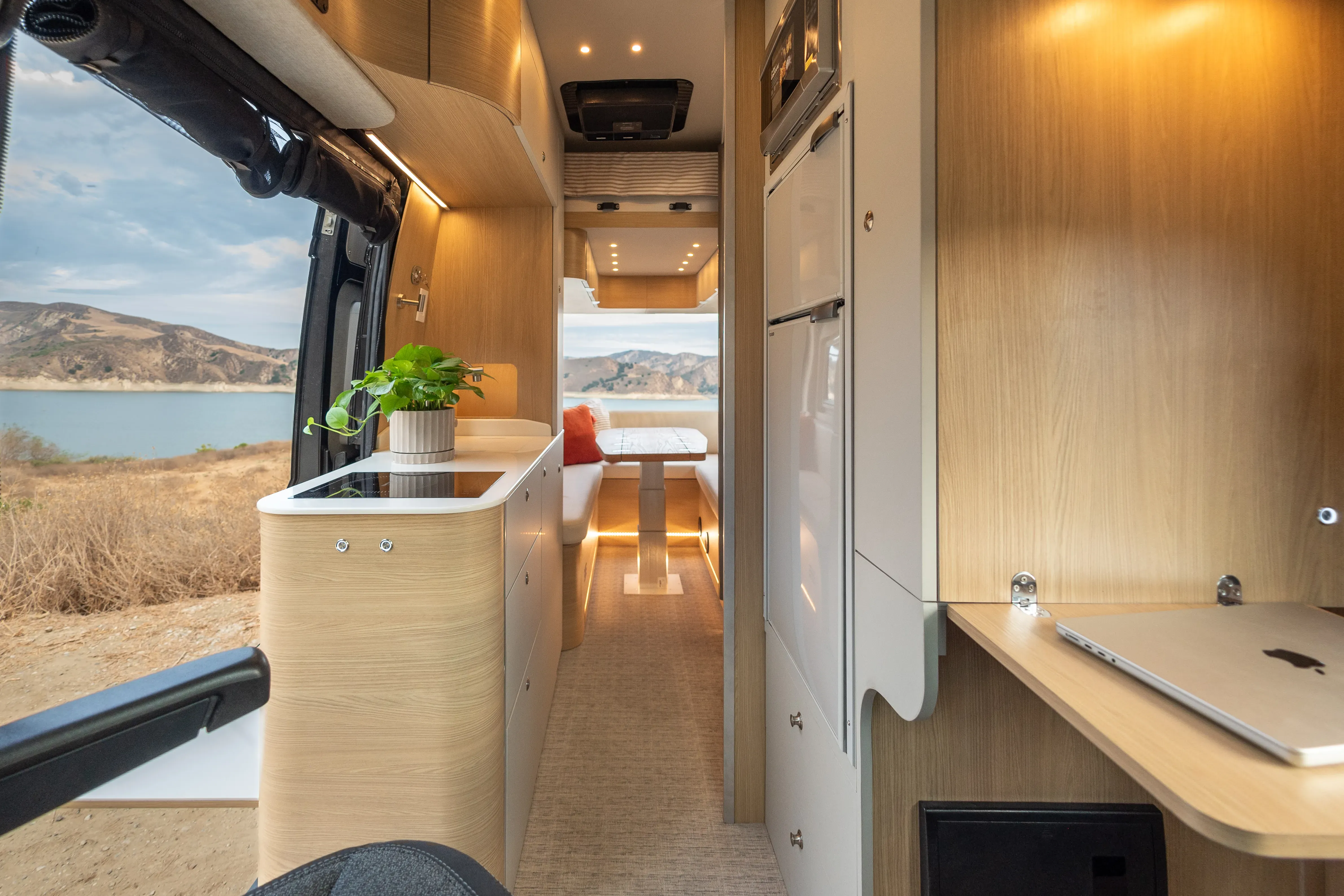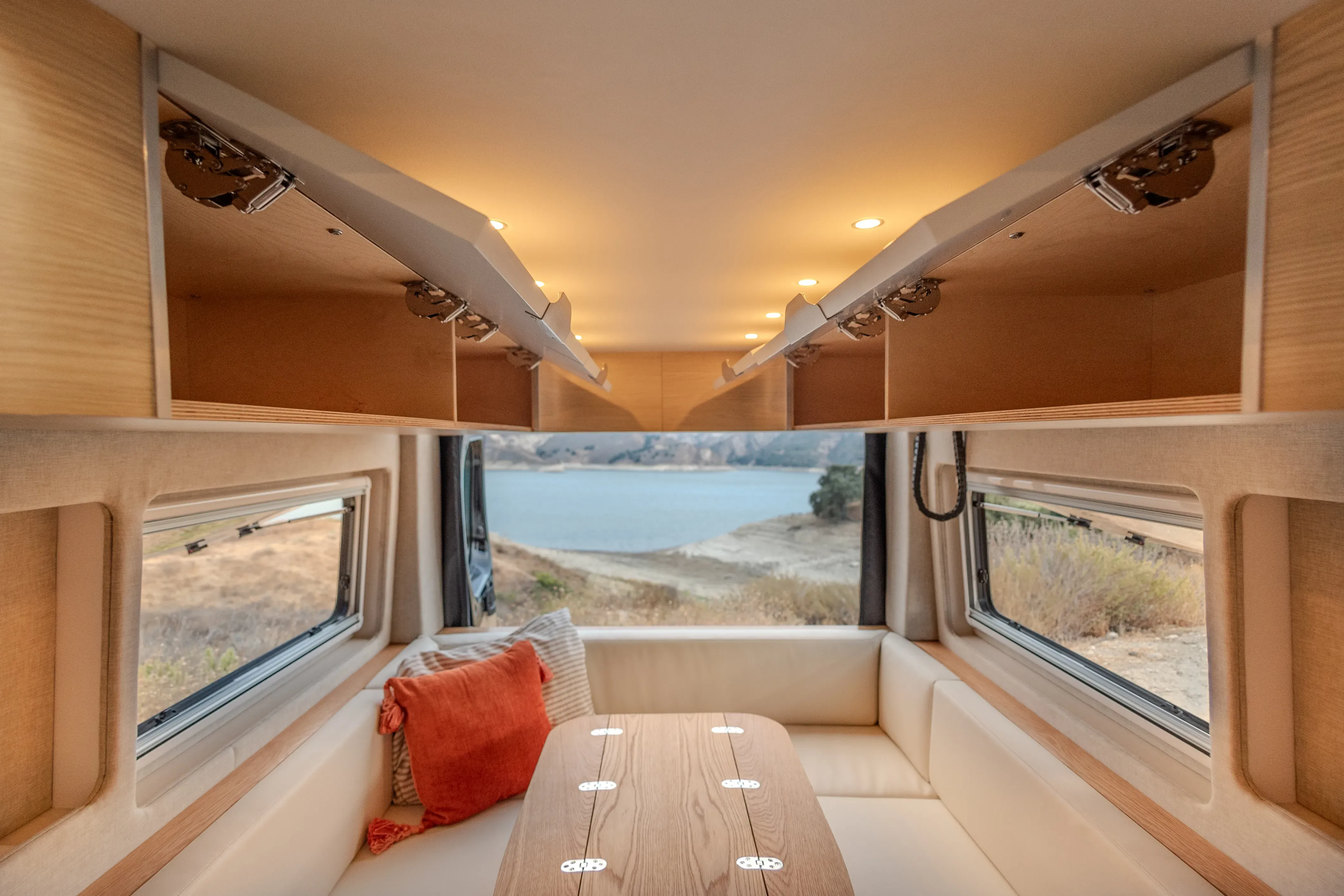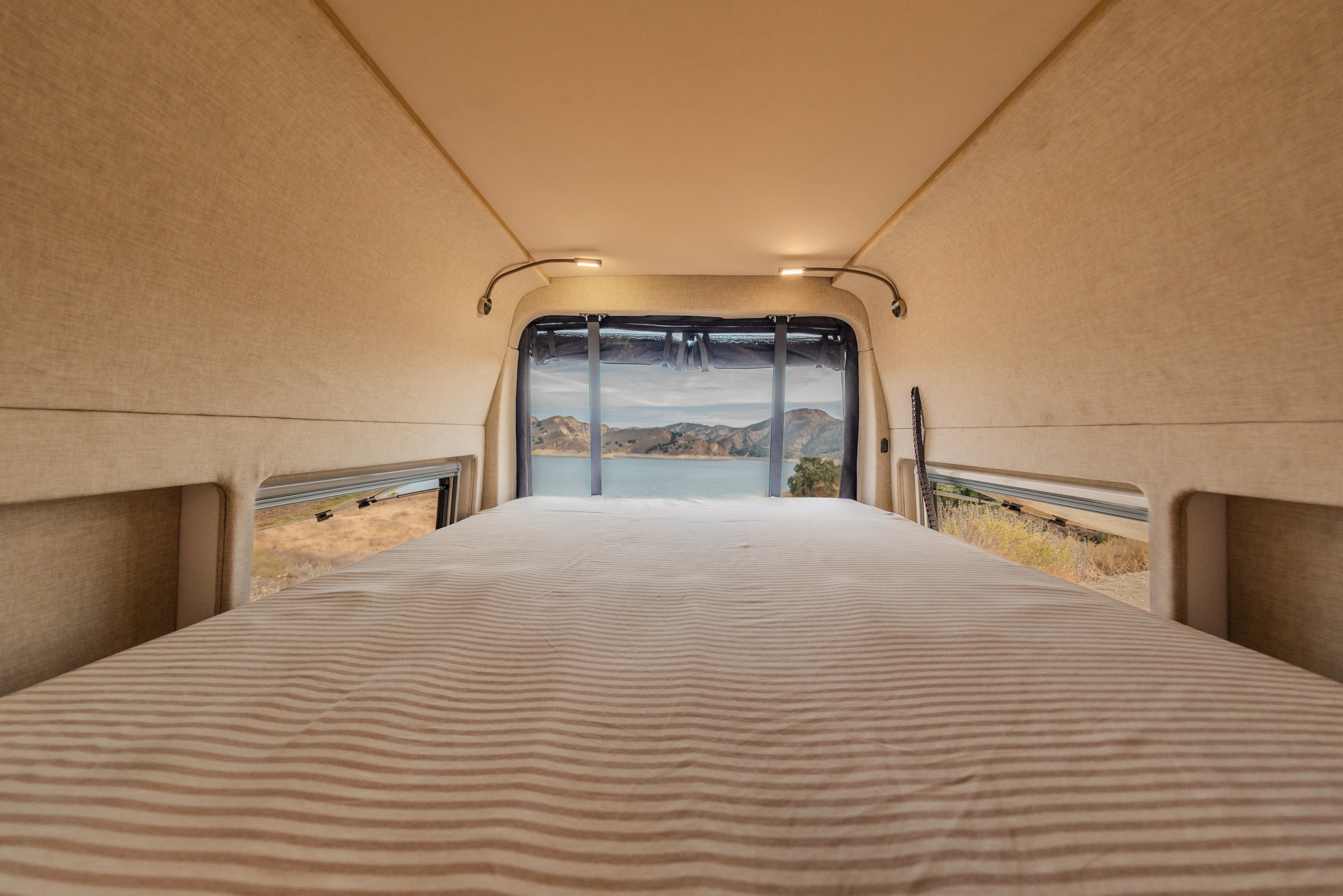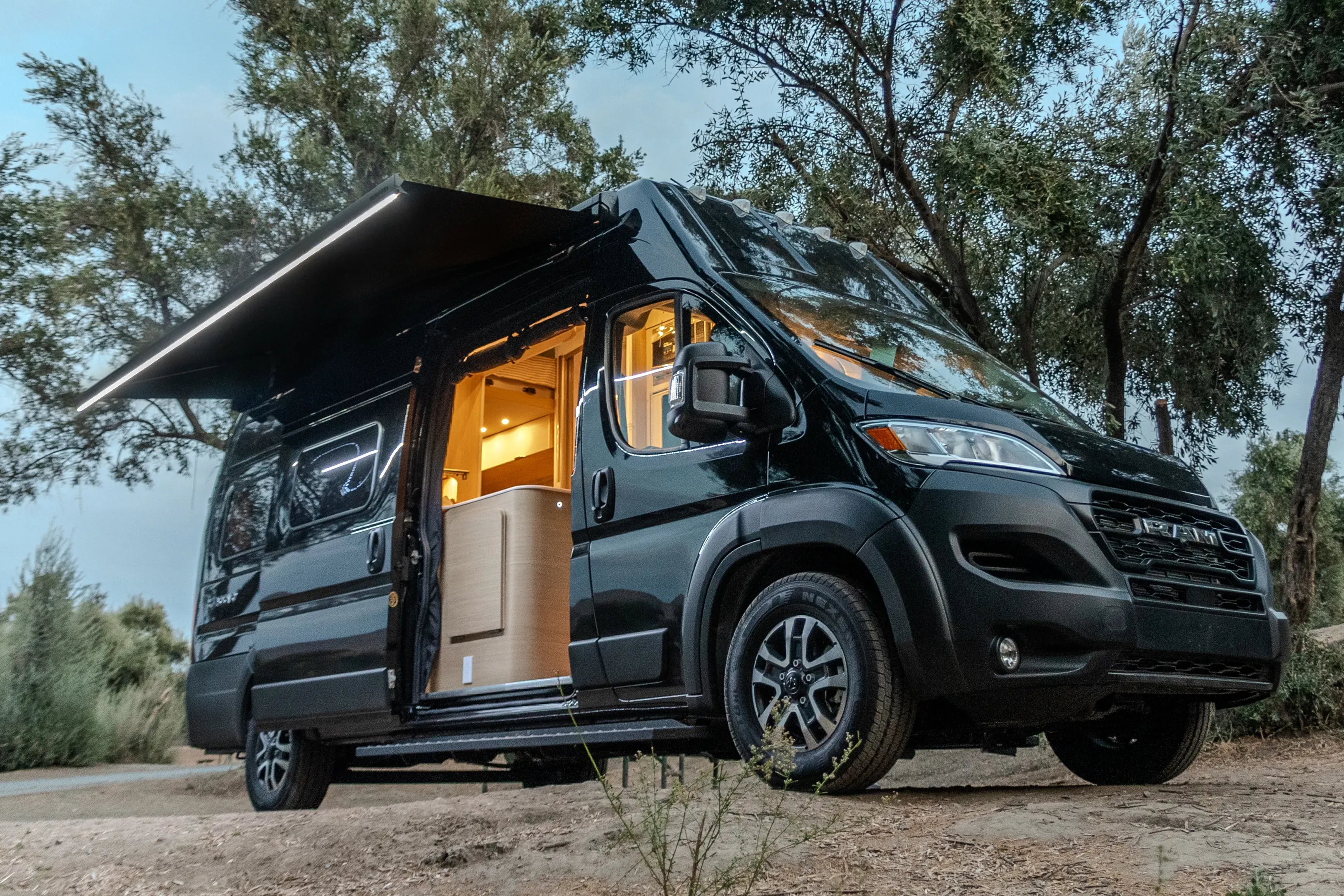Meet us! Adventure Van Expo, May 10–11 in Ventura
Toilet options for camper vans:
Choose the best for your build in 2024
A Complete Survey of Cassette, RV Style, and Alternatives for Van Life
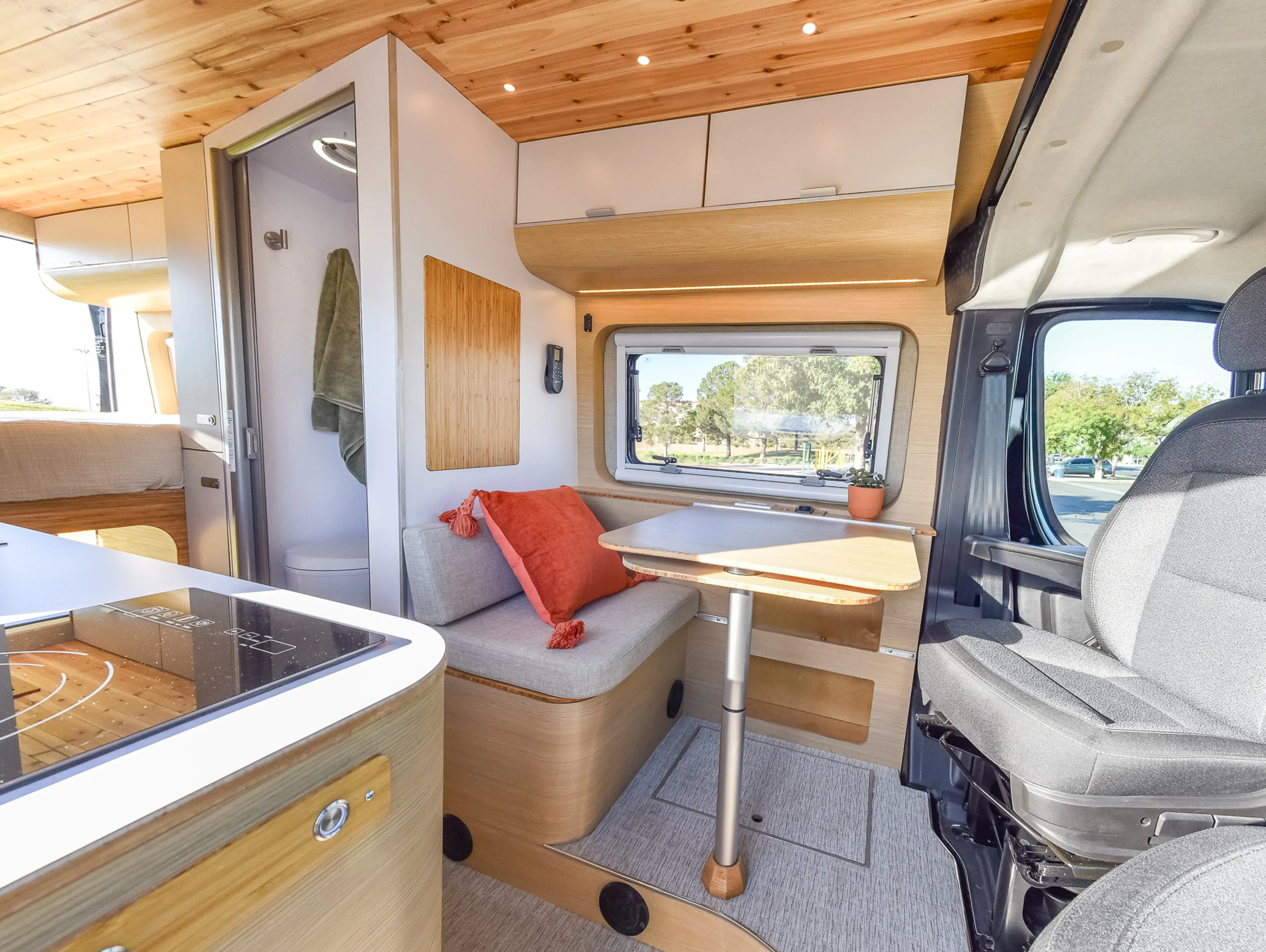
Although it’s not the most glamorous component of van life, choosing the right toilet is essential for enjoying life on the road.
There are six main toilet options for camper vans — cassette, composting, portable, RV (with built-in plumbing), dry, and hybrid cassette. In this blog we explore the pros and cons of each so you can decide which is best for your needs.
At Noovo, we exclusively use the hybrid cassette toilet in our builds due to its convenience, effective odor control, and ease of emptying without requiring a black water tank.
However, we often suggest other options for van builders with different requirements, budgets, or eco-consciousness levels. (Especially for those planning extensive off-grid adventures or prioritizing minimal water usage.) Keep reading for a full overview of each style, including ease of installation, water usage, space needed, waste disposal, odor control, cost, and more.
Quick Recommendations
Best for most van lifers: Hybrid Cassette Toilet
Cassette toilets balance convenience and simplicity with low water usage, high odor control, and easy emptying — without a black water tank.
Best for off-grid use: Composting Toilet
Composting toilets require no water and provide excellent odor control, ideal for long periods without facilities and minimal environmental impact.
Best for permanent campground living: RV Toilet (Built-In Plumbing)
RV toilets offer the most home-like experience with excellent odor control, and are popular for those with regular access to campground hookups and dump stations — and with the stomach and budget for black tank maintenance.
Van Toilet Option | Waste Disposal | Odor Control | Cost |
|---|---|---|---|
Cassette Toilet | Manual emptying of cassette | Moderate | Low |
Hybrid Cassette Toilet | Pull-out cassette for dumping | High | Moderate |
RV Toilet | Dump station required | High | High |
Composting Toilet | Periodic emptying of compost | High | High |
Portable Toilet | Frequent manual emptying | Low to Moderate | Low |
Dry Toilet | Manual disposal of dry waste | Moderate to High | Moderate |
Cassette Toilet
Cassette toilets are the most popular choice for camper van builds due to their simplicity and compact design. They feature a removable waste tank (the "cassette") that can be easily detached for emptying.
With low installation complexity and minimal water usage, cassette toilets are an excellent option for those new to van life or working with limited space.
Key Features:
- Installation: Low complexity, making it suitable for DIY van builders.
- Water Usage: Low, helping to conserve your freshwater supply.
- Odor Control: Moderate effectiveness, usually managed with chemical additives.
- Waste Disposal: Manual emptying of the cassette at designated dump points or public restrooms.
- Space Required: Moderate, typically more compact than built-in RV toilets.
- Cost: Generally low, making it budget-friendly for most van builds.
Cassette toilets are particularly suitable for shorter trips; and for smaller vehicles where space is at a premium.
The ability to empty the waste tank at public restrooms or campground facilities adds convenience for travelers who prefer not to deal with full-size RV dump stations. However, the moderate odor control and need for frequent emptying (especially on longer trips) are key “cons” to consider.
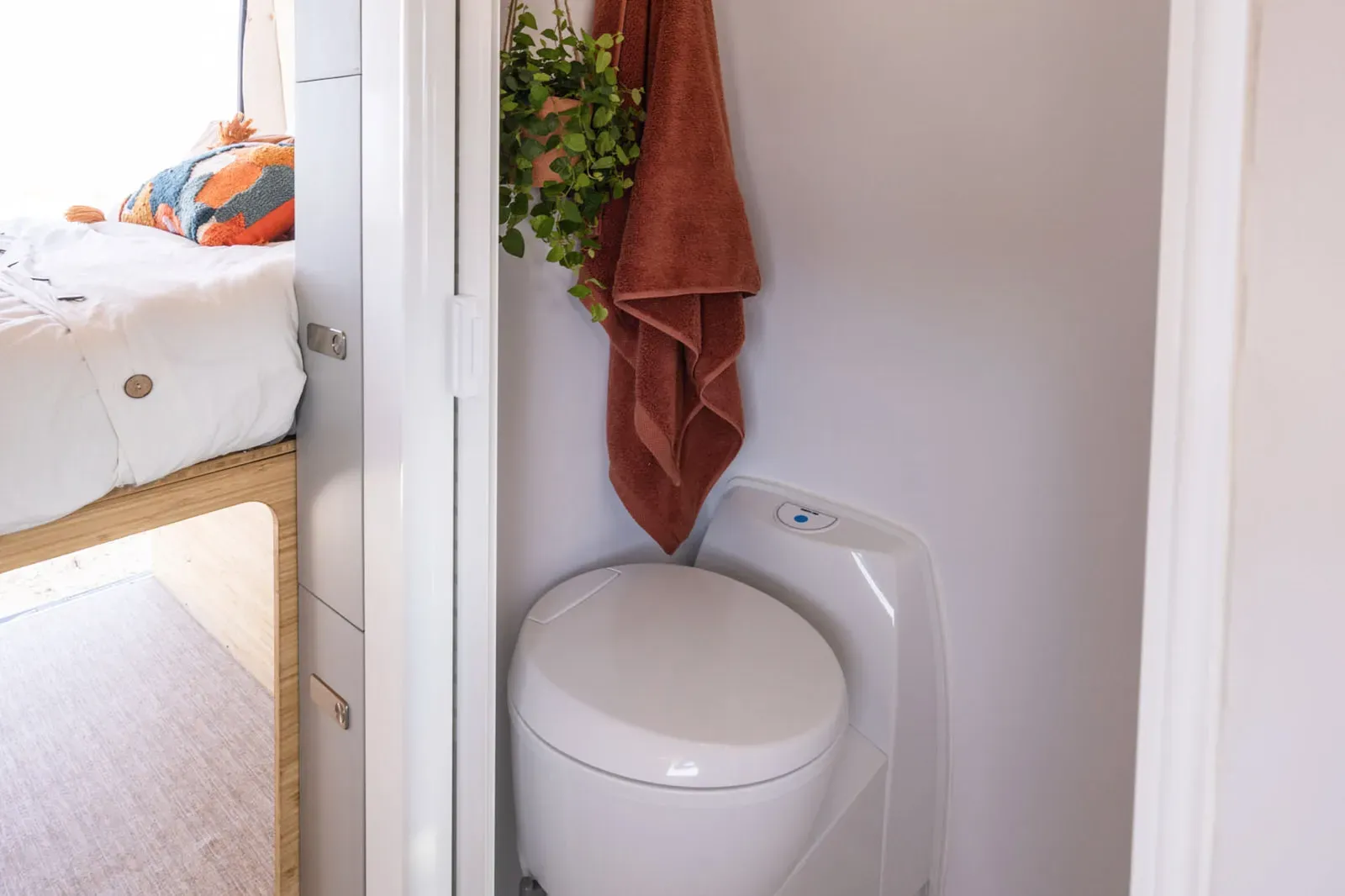
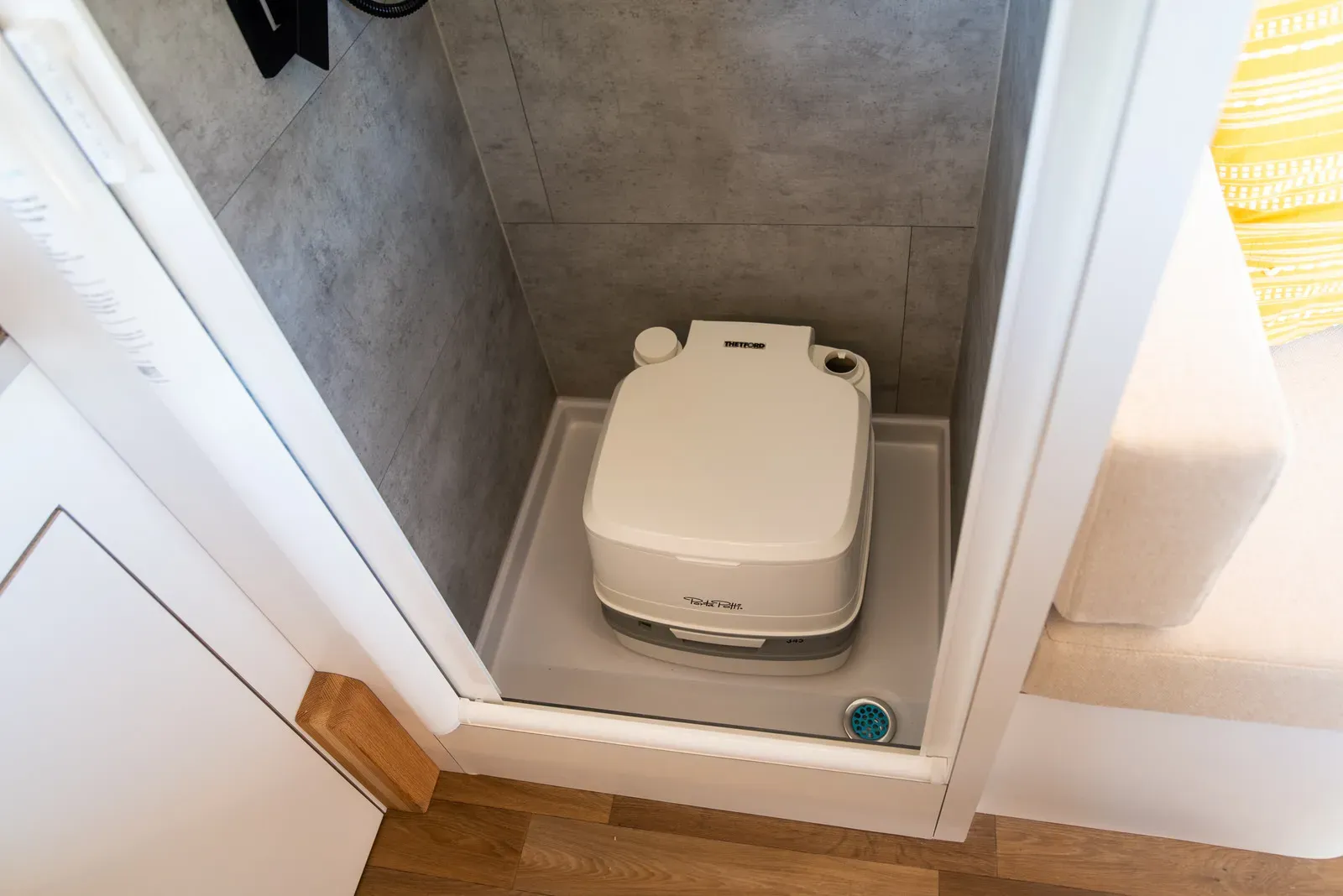
Hybrid Cassette Toilet
Hybrid cassette toilets combine the best features of traditional cassette toilets and RV toilets, offering improved functionality and convenience. These units typically feature a more permanent installation with a pull-out cassette for easy waste disposal.
At Noovo, we've chosen this option for our van builds due to its balance of ease of use and effective waste management. The hybrid cassette gives our customers a similar experience to a plumbed RV toilet but without the drawbacks around maintenance, black water management, and all the costs accompanying RV toilets.
Key Features:
- Installation: Moderate complexity, often requiring some basic plumbing.
- Water Usage: Low, similar to standard cassette toilets.
- Odor Control: High effectiveness, often utilizing advanced sealing systems.
- Waste Disposal: Pull-out cassette for dumping, easier than traditional RV toilets.
- Space Required: Moderate, similar to standard cassette toilets.
- Cost: Moderate, reflecting the enhanced features.
In summary, hybrid cassette toilets are an excellent choice for camper van living when you want a more permanent solution without the need for a black water tank. They offer improved odor control and a more home-like experience compared to standard cassette toilets, while still maintaining the ease of emptying.
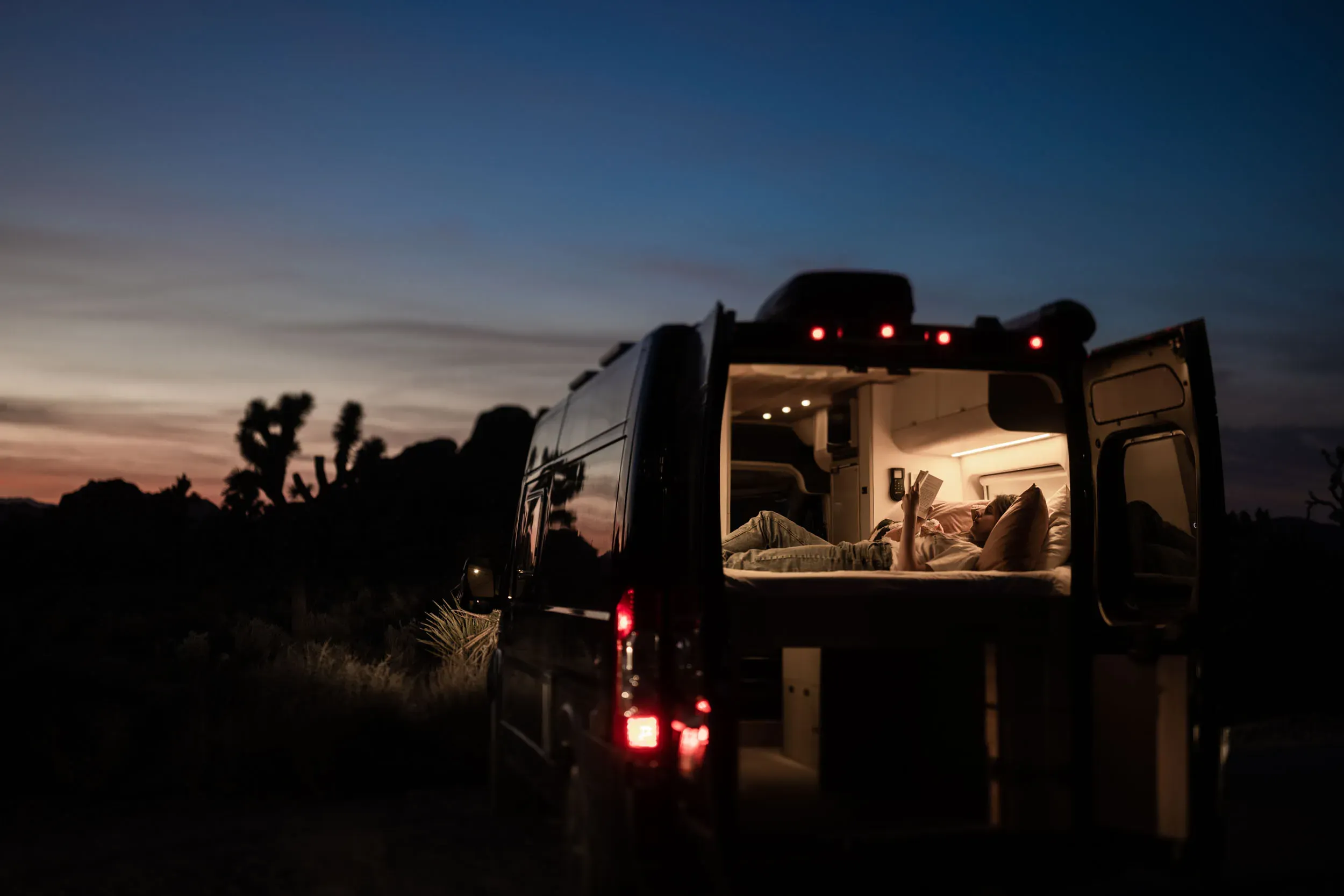
RV Toilet (Built-In Plumbing)
RV toilets with built-in plumbing offer the most home-like experience in a van conversion. These systems are permanently installed and connected to a black water tank, mimicking the functionality of a residential toilet.
While they require more complex installation and maintenance, they provide a high level of comfort for full-time van dwellers. They are particularly popular with retirees since they require no adjustment for someone coming from a full-size RV experience.
Key Features:
- Installation: High complexity, requiring professional plumbing skills.
- Water Usage: High, similar to a residential toilet.
- Odor Control: High effectiveness when properly maintained.
- Waste Disposal: Requires access to RV dump stations.
- Space Required: High, needs room for the toilet and black water tank.
- Cost: High, due to complex installation and additional components.
RV toilets are ideal for those who frequently stay at campgrounds with full hookups or have regular access to dump stations. They offer excellent odor control and the most familiar user experience. However, they require more water, space, and maintenance than other options, including regular black tank cleaning and monitoring.
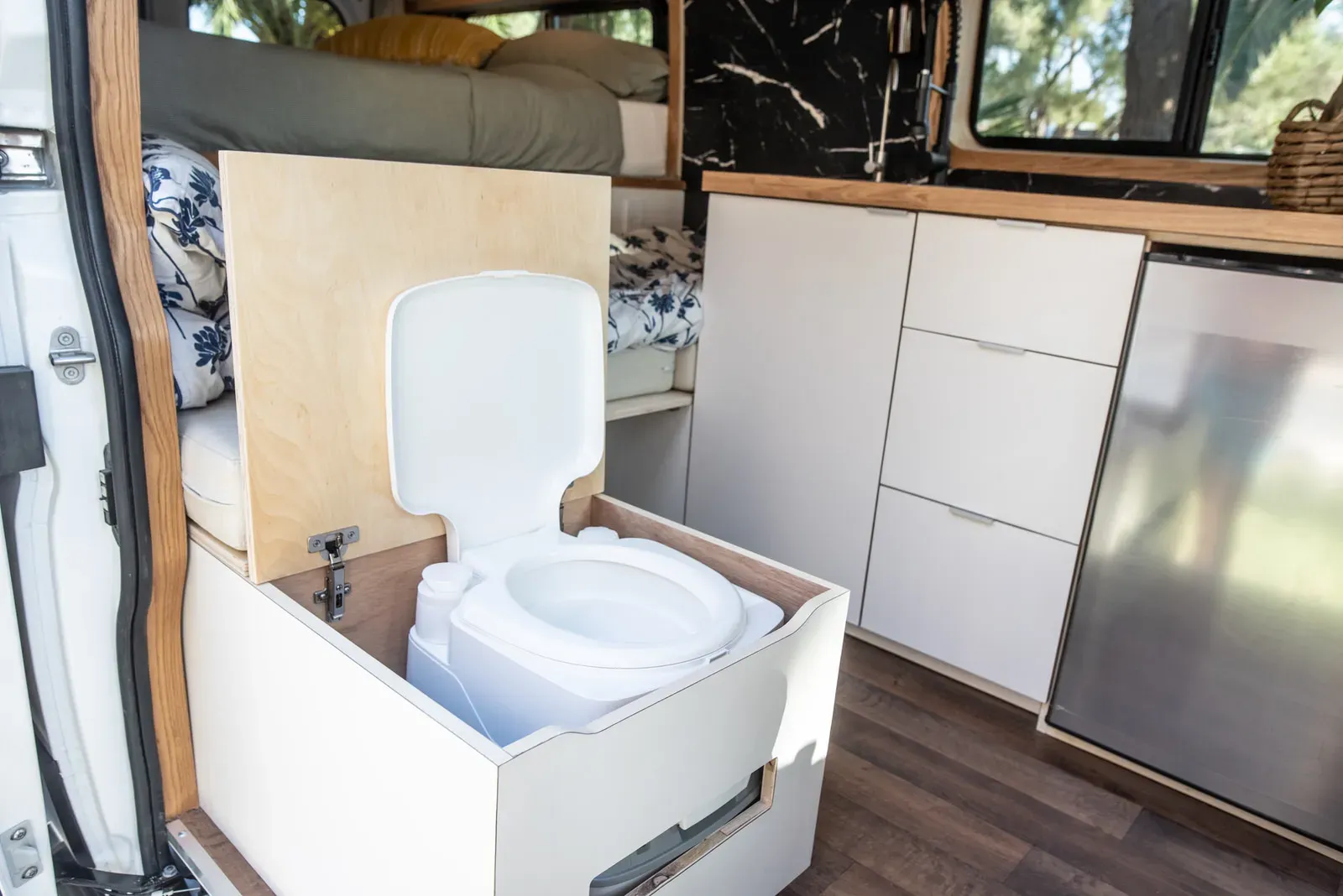
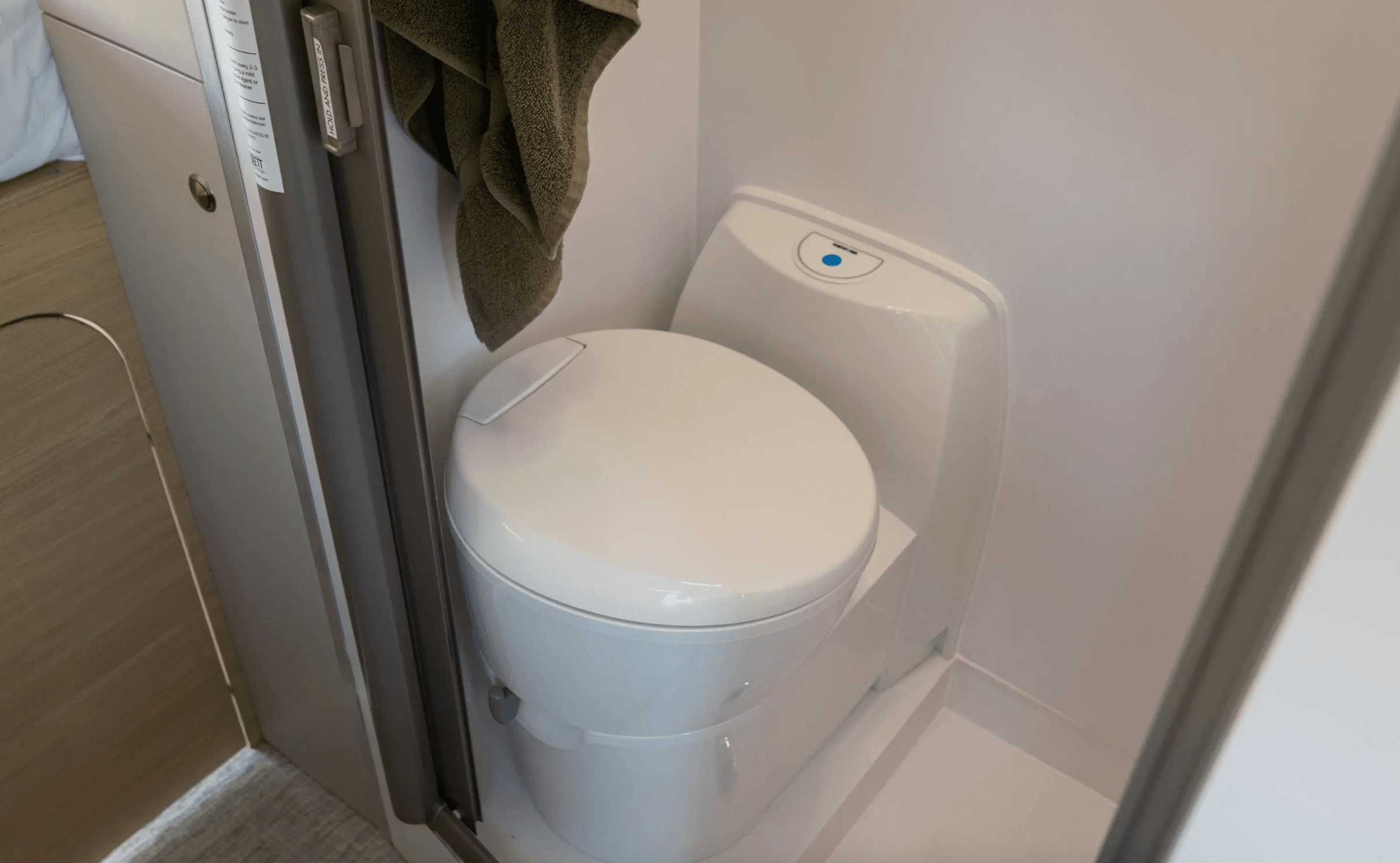
Composting Toilet
Composting toilets are an eco-friendly option that separates liquid and solid waste, using natural processes to break down solids into compost. These toilets are popular among environmentally conscious van lifers and those who spend extended periods off-grid.
Key Features:
- Installation: Moderate complexity, often requiring ventilation installation.
- Water Usage: None, making them ideal for water conservation.
- Odor Control: High effectiveness when properly maintained.
- Waste Disposal: Periodic emptying of compost, often less frequent than other types.
- Space Required: Moderate, though designs vary.
- Cost: High initial investment, but low ongoing costs.
Composting toilets are excellent for long-term off-grid living and minimizing environmental impact. They require no water and produce usable compost, but need more frequent maintenance and user involvement in the waste management process. Some users may need time to adjust to the different use and maintenance routines.
Portable Toilet
Portable toilets are simple, self-contained units that don't require permanent installation. They're a popular choice for weekend warriors or those who want a flexible toilet solution in their van.
Key Features:
- Installation: Very low complexity, no permanent installation required.
- Water Usage: Moderate, used for flushing.
- Odor Control: Low to moderate, depending on usage and emptying frequency.
- Waste Disposal: Frequent manual emptying required.
- Space Required: Minimal, can be stored away when not in use.
- Cost: Low, making them accessible for most budgets.
Portable toilets are ideal for occasional use or as a backup solution. They're easy to move and require no setup, making them versatile for various van layouts. However, they typically have smaller waste capacities and may require more frequent emptying, especially on longer trips or with multiple users.
Dry Toilet
Dry toilets, also known as waterless toilets, are simple systems that collect waste without the use of water. They often use biodegradable bags or a bucket system, making them a low-tech but effective solution for basic waste management in a van.
Key Features:
- Installation: Low complexity, often requiring just a secure mounting point.
- Water Usage: None, conserving water resources.
- Odor Control: Moderate to high, often using natural materials like sawdust.
- Waste Disposal: Manual disposal of dry waste, frequency depends on usage.
- Space Required: Moderate, though designs can be quite compact.
- Cost: Moderate initial cost, low ongoing expenses.
Dry toilets are well-suited for remote and off-grid locations where water conservation is crucial. They offer effective odor control when properly maintained and are relatively simple to use. However, they require more hands-on waste management and may not provide the same level of comfort as water-based systems for some users.
How to Choose: Matching Toilet Types to Your Van Life Style
Ok, so there are a lot of toilet options, many of which are easy to use, clean, and store. Another topic to consider is where in the van you want to put the toilet. Depending on which one you choose, some can be stowed away in a cabinet or bin, or for more full-time use they can be built in combination with your shower set-up. Check out the Noovo bathroom options for ideas!
If you still aren’t sure which one is right for you, you can also think about what length of trips you will be taking in your van.
For Long Trips
Consider either a hybrid cassette toilet or an RV toilet with built-in plumbing. These options offer the best balance of comfort, odor control, and waste capacity for extended travel. The hybrid cassette provides easier emptying, while the RV toilet offers a more home-like experience if you have regular access to dump stations.
For Short Trips
Portable or standard cassette toilets are excellent choices. They're easy to install, use, and maintain for weekend getaways or brief road trips. These options don't require permanent installation, saving space when not in use.
For Stealth Camping or Off-Grid Adventures
Prioritize compact, self-contained options like dry toilets or composting toilets. These use minimal space, require no water hookups, and can be easily concealed. They're ideal for boondocking or urban stealth camping where discretion and self-sufficiency are key.
Frequently Asked Questions

Written by
Keller is a copywriter and storyteller, bringing narratives of adventure-driven brands to life.
Published on February 04, 2025
Want to read more?
Discover similar content with these recommended articles.

